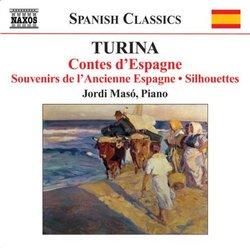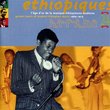| All Artists: Turina, Maso Title: Turina: Contes d'Espagne - Piano Music, Vol. 5 Members Wishing: 0 Total Copies: 0 Label: Naxos Original Release Date: 1/1/2009 Re-Release Date: 3/31/2009 Genre: Classical Styles: Chamber Music, Historical Periods, Classical (c.1770-1830) Number of Discs: 1 SwapaCD Credits: 1 UPC: 747313037070 |
Search - Turina, Maso :: Turina: Contes d'Espagne - Piano Music, Vol. 5
 | Turina, Maso Turina: Contes d'Espagne - Piano Music, Vol. 5 Genre: Classical Jordi Masó's acclaimed series of Joaquin Turina's Piano Music continues with the evocative — Spanish Tales, Souvenirs of Old Spain and Silhouettes, consolidating the young pianist's — reputation as a leading interpreter... more » |
Larger Image |
CD DetailsSynopsis
Product Description Jordi Masó's acclaimed series of Joaquin Turina's Piano Music continues with the evocative Spanish Tales, Souvenirs of Old Spain and Silhouettes, consolidating the young pianist's reputation as a leading interpreter of this distinctively Iberian repertoire. 'Jordi Masó is one of Spain's leading pianists.' (MusicWeb on Vol 1, 8.557150), 'Masó, as always, is excellent' (Scherzo on Vol 2, 8.557438), 'You can't go wrong with Masó he is very sympathetic' (Fanfare on Vol 3, 8.557684), 'He can make a melody sing' (MusicWeb on Vol 4, 8.570026). Similar CDs
|
CD ReviewsLanguid or Lively, and Instantly Lovable J Scott Morrison | Middlebury VT, USA | 04/20/2009 (5 out of 5 stars) "Turina is probably the least well-known and youngest of Spain's four most honored composers of the twentieth-century -- Albéniz, Granados, de Falla and Turina. And his music is, in most instances, the least colored by Spanish influences. But that is hardly the case with the music contained on this disc, the fifth of Jordi Masó's traversal of Turina's complete piano music. All the music here is specifically Spanish in character: the two 'Tales of Spain' suites, the 'Souvenirs of Old Spain' suite, and 'Silhouettes'. Turina was a fine pianist and his piano music is sufficiently challenging to make it fun to play and rewarding to hear.
Contes d'Espagne, Series I (1918), has seven pieces that are descriptive of sights and sounds from all over Spain -- Salamanca, Logroño, Valencia, Murcia, Granada, Málaga and Barcelona. I particularly respond to 'Miramar' (Valencia), 'Rompeolas' (also called 'Jeux des vagues') from Barcelona. Contes d'Espagne, Series II (1928) focuses more narrowly on scenes from Andalusia, Turina's native area. Pictured, among others, are a fiesta in Cordoba, as well as that city's mosque and a Moorish song. Particularly virtuosic and memorable -- and an example both 'languid and lively' -- is the section called 'Les buveurs de manzanilla' ('Drinkers of Manzanilla', a kind a sherry from Sanlúcar). Turina's style had matured in the intervening ten years between the two Tales of Spain suites and although both are dripping with Spanish local color, the second suite is more spare and straightforward. Souvenirs de l'Ancienne Espagne, Op. 48 (1929) followed immediately after the second Tales of Spain. In it Turina paints depicts characters more usually associated with two famous operas -- Carmen and Don Giovanni -- but his Carmen and his Don Juan have nothing to do with those masterpieces. Instead they are completely original works that evoke the spirit of the their literary sources -- Prévost's Carmen and Tenorio's Don Juan -- without making reference to Bizet or Mozart. However, one of the suite's four movements is an habañera, but aside from its rhythm it is nothing like Bizet's sultry dance and aria for his Carmen. The suite ends with a lively peasant dance called Estudiantina. The disc ends with Silhouettes, Op. 70 (1931) which depicts famous Spanish landmarks: Segovia's aqueduct, Granada's Torre de la Vela, Toledo's Torre del Oro, and the lighthouse at Cadiz. 'L'Aqueduc' is particularly effective -- spooky, almost -- in depicting the tenebrous atmosphere of that ancient structure. Jordi Masó has been busily recording all manner of early twentieth century music from Spain and France. Particularly notable are his recordings of music by Federico Mompou (e.g., Mompou: Piano Music, Vol. 1, Granados Granados: In The Village; Piano Music Vol. 10, and Déodat de Séverac Déodat de Séverac: Scenes of Southern France: Cerdaña; En Languedoc. He is a fine, sensitive, technically secure pianist whose career is, one hopes, burgeoning as a result of these many recordings. As with his other discs, the recorded sound is perfectly lifelike. Scott Morrison " |





